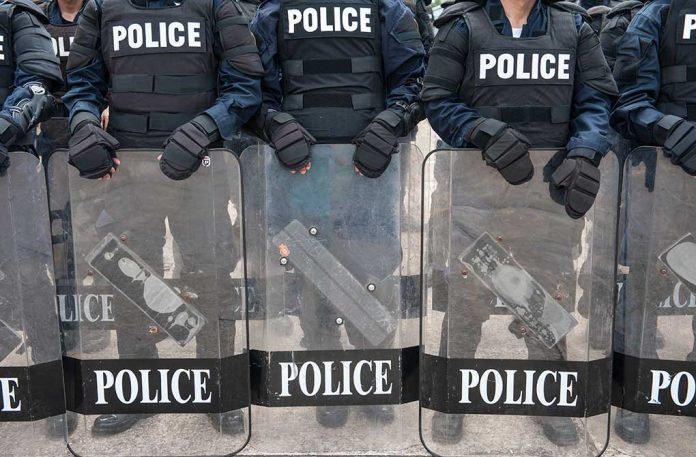
New Jersey Governor Phil Murphy has instructed state law enforcement agencies to cease cooperation with federal immigration authorities, creating a direct challenge to Trump administration policies and raising questions about state versus federal jurisdiction.
Key Takeaways
- Governor Murphy ordered New Jersey police to stop cooperating with ICE agents, reinforcing the state’s 2018 Immigrant Trust Directive.
- State police have been specifically instructed not to treat ICE’s administrative warrants as “NCIC Hits” or alert federal authorities when encountering individuals on these lists.
- The directive comes after the Trump administration added over 27,000 “Outstanding Administrative Warrants for Removal” to the FBI’s national crime database.
- U.S. Attorney for New Jersey, Alina Habba, has criticized the move, emphasizing that “Executive Orders will be followed and enforced”.
- Murphy has previously made headlines for claiming he may have deterred ICE agents from conducting raids near his property and suggesting he housed an undocumented immigrant.
New Jersey Defies Federal Immigration Enforcement
New Jersey’s stance on immigration enforcement has taken a decisive turn as Governor Phil Murphy, with the backing of Attorney General Matt Platkin, has directed state law enforcement agencies to halt cooperation with federal immigration authorities. This policy reinforces New Jersey’s 2018 Immigrant Trust Directive, which established boundaries between local policing and federal immigration enforcement. The latest directive specifically instructs officers not to act on administrative warrants from Immigration and Customs Enforcement (ICE) that have been added to the FBI’s National Crime Information Center (NCIC) database.
NJ Governor Defies ICE -Orders Local Police to End Cooperation with Immigration Officials https://t.co/s4nPTptMGb pic.twitter.com/RDmnaOAJUK
— Julio 🇵🇷 (@combatinsight) April 10, 2025
The directive comes as a direct response to the Trump administration’s addition of over 27,000 “Outstanding Administrative Warrants for Removal” to the NCIC system. Colonel Patrick Callahan of the New Jersey State Police issued an internal memo making it clear that these administrative warrants should not be treated as standard alerts requiring action. The memo explicitly states that officers must not contact ICE when encountering individuals on this list, nor make arrests based solely on administrative warrants for immigration violations.
Constitutional Clash Between State and Federal Authority
This policy decision has set the stage for a potential constitutional showdown over the limits of state autonomy versus federal authority in immigration enforcement. U.S. Attorney for the District of New Jersey, Alina Habba, has already pushed back against Murphy’s directive with a clear warning, “Let me be clear, Executive Orders will be followed and enforced in the State of New Jersey.” This statement signals potential federal intervention if New Jersey continues to obstruct immigration enforcement efforts directed by the current administration.
New Jersey officials defend the policy as necessary to maintain community trust in law enforcement, arguing that blending local policing with federal immigration enforcement undermines public safety by making immigrant communities reluctant to report crimes or cooperate with police. Critics, however, see the directive as an unlawful obstruction of legitimate federal efforts to enforce immigration laws and remove individuals who have been ordered deported through proper legal channels.
Murphy’s History of Immigration Activism
Governor Murphy’s latest directive aligns with his established pattern of opposition to federal immigration enforcement. In a press conference following President Trump’s election victory, Murphy referenced his actions regarding ICE operations, “There was a time when ICE was just randomly showing up on street corners and apprehending… brothers and sisters from the immigrant community.” He described personally intervening in what he believed was an imminent ICE operation near his Middletown mansion.
Murphy recently faced criticism after appearing to suggest he housed an undocumented immigrant at his property. This comment drew attention from Trump border czar Tom Homan, who suggested Murphy’s actions could potentially lead to prosecution under U.S. immigration law. While supporting immigrant communities, Murphy has maintained that New Jersey would seek common ground with the administration while upholding what he describes as the state’s values regarding immigration policy.
Implications for Law Enforcement
New Jersey’s law enforcement officers now find themselves in a difficult position, caught between conflicting state and federal directives. Colonel Callahan’s memo leaves no ambiguity about expectations, warning officers that compliance with the state directive is mandatory. “Taking law enforcement action by arresting a subject based solely on an ‘Outstanding Administrative Warrant’ would violate the Attorney General’s Immigration Trust Directive,” warned Callahan. Officers who disregard this instruction could face disciplinary consequences under state authority.
The directive creates a practical separation between state and federal law enforcement databases, as New Jersey officers are instructed to essentially ignore certain alerts in the NCIC system – something unprecedented in typical law enforcement cooperation protocols. This policy approach places New Jersey at the forefront of states taking concrete actions to limit cooperation with federal immigration authorities, establishing what could become a model for other states with similar political leanings on immigration enforcement.
Sources:
NJ Gov. Phil Murphy boasted about thwarting ICE raid with his taxpayer-funded security detail
State vs. Federal: New Jersey Governor Orders Police to Defy ICE Warrants Amid Immigration Clash
NJ Gov. Orders Local Police to Stop Working with Immigration Officials







